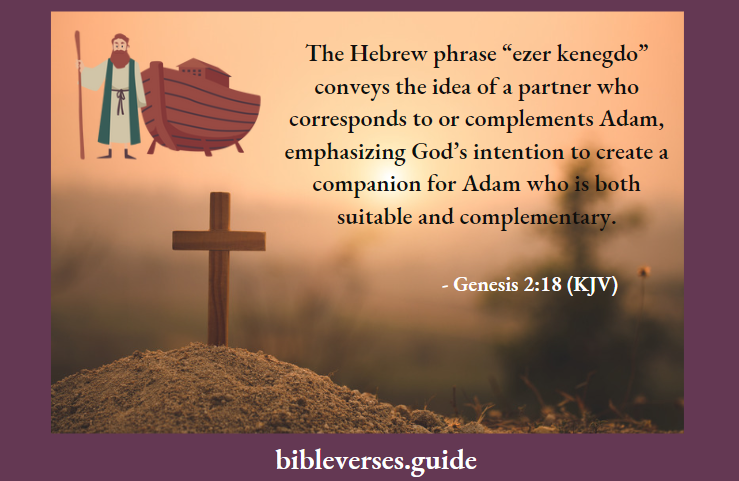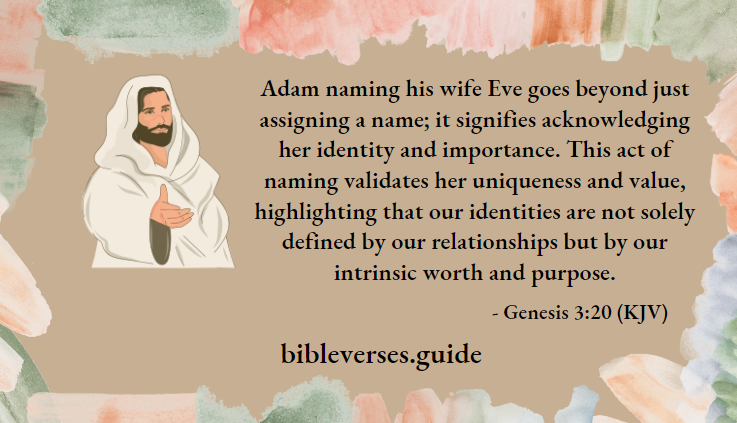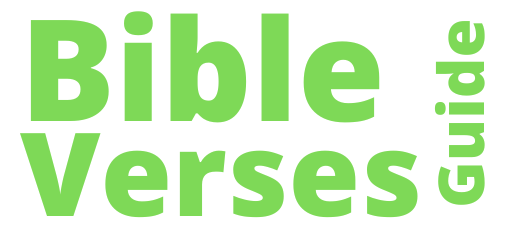“And the LORD God said, It is not good that the man should be alone; I will make him a help meet for him.”
Genesis 2:18 (KJV)
This verse from the Bible is part of the creation story, focusing on the making of the first human, Adam, and the subsequent creation of Eve. God states that it is not suitable for man (Adam) to be alone, highlighting the social nature of human beings who thrive in relationships and communities.
Genesis 2:18 Meaning
“Help meet” is often understood as a suitable helper or companion.

This verse underscores the importance of companionship and relationships in human life, emphasizing the significance of marriage and partnership as a divine institution to fulfill the need for companionship and support.
In the broader context of the creation narrative, Genesis 2:18 lays the groundwork for the creation of Eve as Adam’s partner, completing the divine plan for humanity and establishing marriage as a fundamental aspect of human existence.
Genesis 2:18 (KJV) Points To Ponder:
Importance Acknowledgment: The verse emphasizes the value of companionship and partnership, recognizing the significance of our role in relationships and society. It signifies that we are companions and essential partners in life’s journey.
Purposeful Design: God’s plan to create a “help meet” indicates that women were intentionally designed for a supportive and companionate role, underscoring our value and impact on others. Understanding our purpose empowers us to embrace our roles as supporters, nurturers, and guides.
Equality And Partnership: “Help meet” implies an equal partnership rather than a subordinate role, emphasizing women as companions and supporters alongside men. This notion empowers us to assert ourselves confidently, knowing our voices and contributions are equally valuable.
“It Is Not Good For Man To Be Alone” Bible Verse
Strength And Capability: Described as a “help meet,” women are portrayed as strong, capable, and proactive individuals shaping our shared journey. Recognizing our inherent abilities empowers us to fulfill our roles confidently and continuously.
Unity And Solidarity: Genesis 2:18 encourages unity and solidarity among women, emphasizing that we stand together as supportive sisters, facing challenges collectively. This unity strengthens and enables us to know that we are stronger together.
Genesis 2:18 affirms our significance, purpose, equality, strength, and unity. It reminds us that our presence is not only desired but essential, highlighting our collective ability to influence a world where our voices are heard, our contributions are valued, and our worth is celebrated.
“And Adam called his wife’s name Eve; because she was the mother of all living.”
Genesis 3:20 (KJV)
Genesis 3:20, following Adam and Eve’s disobedience in the Garden of Eden, depicts Adam naming his wife “Eve,” meaning “life” or “living,” recognizing her as the mother of all living beings.
This Verse Conveys Various Layers Of Meaning:
Recognition Of Eve’s Importance: By naming his wife “Eve,” Adam acknowledges her vital role as the mother of all humanity. Despite the repercussions of their disobedience, Adam respects and celebrates Eve’s significance as the ancestor of the human race.
Symbol Of Hope: Designating Eve as the mother of all living beings symbolizes hope amidst the aftermath of their fall. Despite the introduction of death and suffering due to their sin, the promise of life and future generations endures.
Confirmation Of God’s Covenant: This naming reaffirms the fulfillment of God’s covenant with Adam and Eve to multiply and populate the earth (Genesis 1:28). Despite their expulsion from Eden, God’s plan for humanity’s continuity persists through Eve’s role as the mother of all living beings.
Acknowledgment Of Eve’s Identity: Adam validates her identity and purpose in naming his wife. The name “Eve” signifies her role as the source of life and energy for all humanity, underscoring her importance in God’s design for creation.
Bible Verses About Companionship And Relationships
Relation To Jesus Christ: In Christian belief, a connection exists between Eve as the mother of all living and the role of Mary, Jesus Christ’s mother. Mary is often viewed as the “New Eve” or “Second Eve” because she becomes the vessel through which redemption and new life enter the world through her obedience to God.
In essence, Genesis 3:20 encapsulates Eve’s pivotal role as the mother of all humanity, affirming her identity and purpose in God’s plan for creation despite the consequences of sin.
Genesis 3:20 (KJV) Points to Ponder:

Moreover, being referred to as “the mother of all living” elevates motherhood to a place of respect and esteem. It honors the nurturing and life-sustaining role women fulfill. Identifying ourselves as part of this lineage of nurturers encourages us to embrace our roles as caregivers, nurturers, and preservers of life.
Further, designating Eve as the mother of all living establishes a deep connection between women and all living creatures. It underscores our interdependence with the natural world. It stresses our duty to protect and nurture life in all its forms.
Recognizing our role as caretakers of life empowers us to advocate for the planet’s well-being and its inhabitants.
God’s Design For Relationships (Genesis 2:18)
Additionally, Eve’s legacy as the mother of all living illustrates women’s profound influence on history. It serves as a reminder that our actions and decisions echo through time, shaping the world for future generations.
Understanding our potential for impact and change motivates us to work towards positive transformations in our communities and beyond.
In sum, Genesis 3:20 confirms our identity, honoring our roles as nurturers and caregivers, emphasizing our connection to all living beings, and acknowledging our capacity for influence and legacy. It reinforces that we are valued, respected, and capable of making a meaningful impact on the world.
